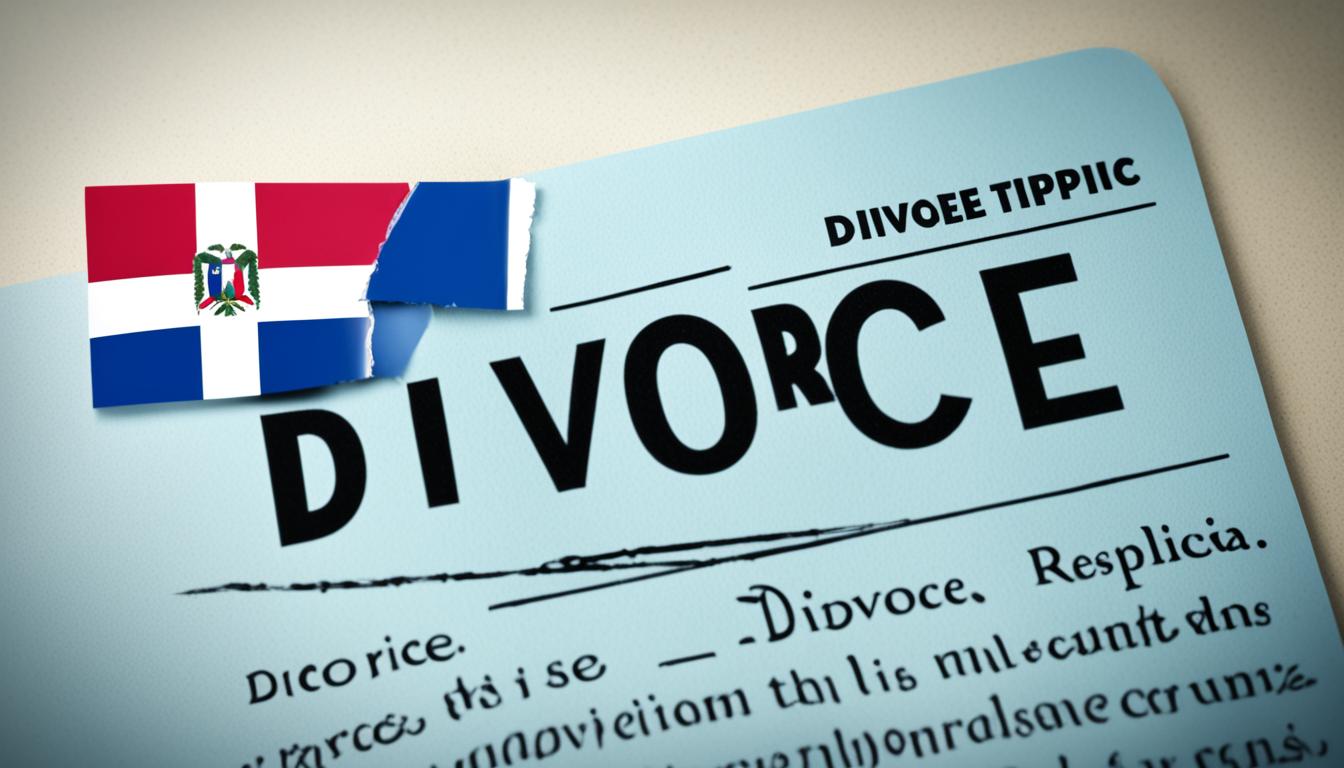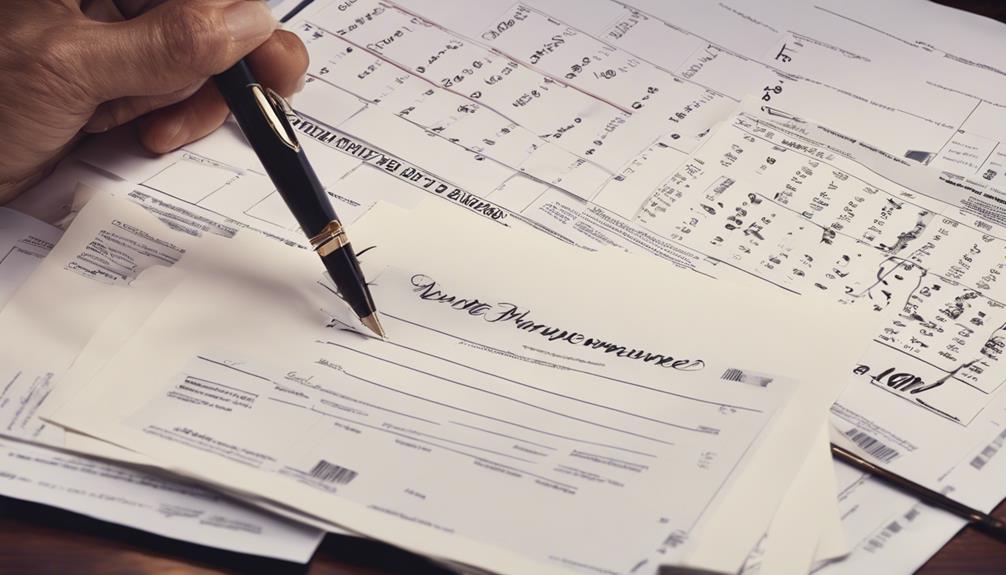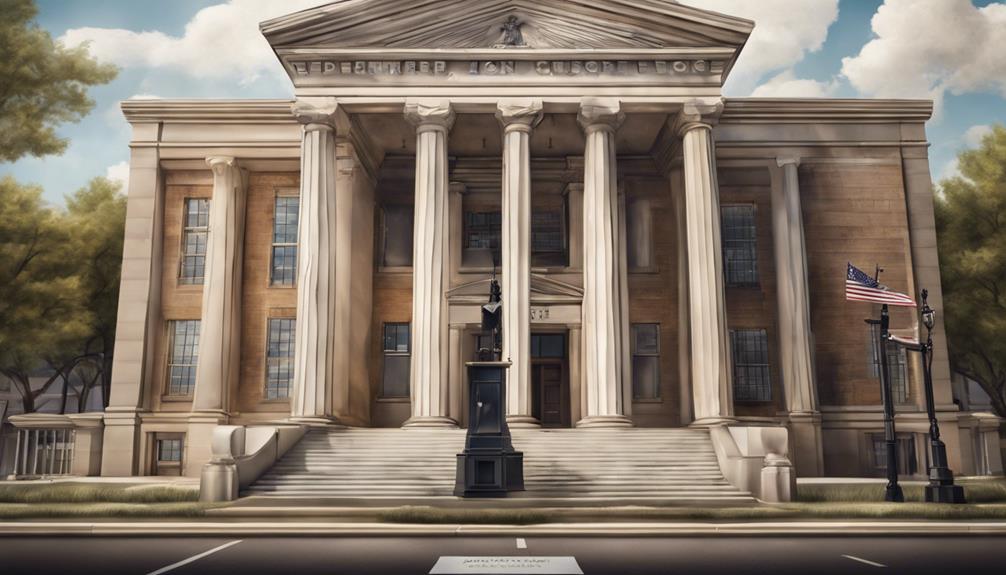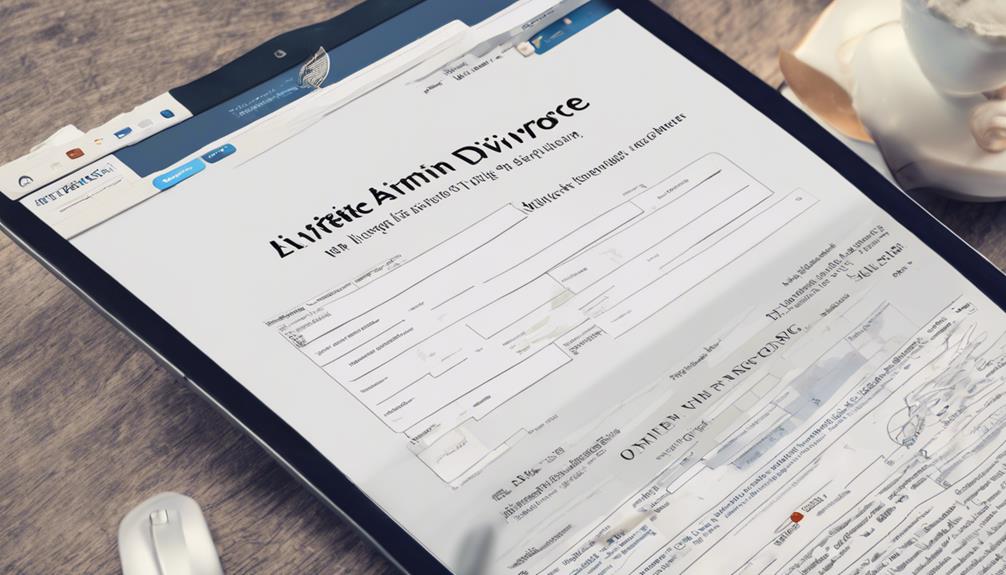Did you know that many Americans choose to complete their divorces in the Dominican Republic? This Caribbean country has become a popular choice for individuals looking to end their marriages due to its straightforward processes and flexible regulations. However, it is important for individuals to be aware of the important legal limitations before moving forward with a divorce in the Dominican Republic.
In this article, we will explore the ins and outs of Dominican Republic divorce law, including the separation process, legal restrictions, and the recognition of divorces obtained abroad. Whether you are considering a divorce or simply curious about this unique aspect of international law, read on to gain a comprehensive understanding of Dominican Republic divorce law.
Key Takeaways:
- Dominican Republic is a popular destination for U.S. citizens seeking a divorce due to its straightforward process.
- Legal restrictions may apply to divorces obtained abroad, so it is important to consult with a local attorney.
- There are two types of divorces available in the Dominican Republic: divorce by mutual consent and divorce for cause.
- The process of obtaining a Dominican divorce decree involves specific steps and document requirements.
- The recognition of Dominican divorces by other governments, including the United States, can vary depending on local laws and regulations.
Types of Divorce in the Dominican Republic
In the Dominican Republic, foreigners have the option to choose between two types of divorces: divorce by mutual consent and divorce for cause.
Divorce by mutual consent allows the demanding party to dissolve the marriage without the need to prove a specific cause. However, both parties must demonstrate their mutual agreement to end the marriage. Importantly, residency is not a requirement for this type of divorce. However, at least one party must appear at the hearing.
On the other hand, divorce for cause is based on specific grounds such as incompatibility of character or adultery. To proceed with a divorce for cause, the plaintiff or their legal representative must personally appear before the court. The judge holds broad powers in a divorce for cause, which includes determining the division of marital properties and support payments.
In summary:
- Divorce by mutual consent: No need to prove a specific cause, but mutual agreement required. Residency not required, but one party must appear at the hearing.
- Divorce for cause: Based on specific grounds like incompatibility of character or adultery. Plaintiff or legal representative must appear personally. Judge determines property division and alimony.
Understanding the different types of divorce available in the Dominican Republic is crucial for individuals seeking to dissolve their marriage in the country.
Obtaining a Dominican Divorce Decree
To obtain a Dominican divorce decree, one of the spouses must appear in person in court in Santo Domingo, while the absent spouse can authorize an attorney to appear on their behalf. The process typically takes about an hour and requires certain documents, including the original or certified copy of the marriage certificate, a special power of attorney executed by the non-appearing spouse, and proof of identity. It is essential to follow the proper procedure and obtain a copy of the divorce decree for legal purposes.
The Dominican public registry offices operate differently from those in the U.S., and records can only be retrieved chronologically. Therefore, it is advisable to hire a lawyer or representative to obtain the extract on your behalf if you cannot be physically present in the Dominican Republic.
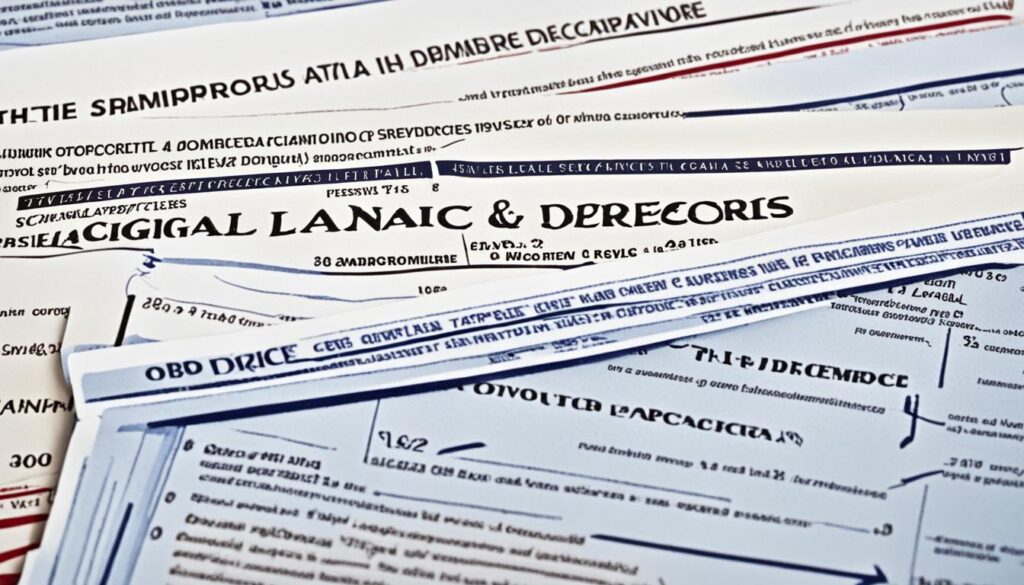
Procedure for Obtaining a Dominican Divorce Decree:
- One spouse must appear in court in Santo Domingo.
- The absent spouse can authorize an attorney to appear on their behalf.
- Required documents include:
- The original or certified copy of the marriage certificate.
- A special power of attorney executed by the non-appearing spouse.
- Proof of identity.
It is important to ensure that all necessary documents are prepared and presented during the divorce proceedings. By following the proper procedure and obtaining a copy of the divorce decree, individuals can ensure that their divorce is officially recognized and legally enforceable.
Recognition of Dominican Divorces by Other Governments
Dominican divorces are generally looked upon with disfavor in the United States. Recognition of a Dominican divorce by a foreign jurisdiction, including the United States, will depend on the laws of that jurisdiction. While some states may grant comity, others may not recognize a Dominican divorce. New York is one of the few states that recognize bilateral Dominican divorces, but specific conditions must be met, such as both parties participating in the divorce proceedings and one party physically appearing before the court in the Dominican Republic. It is crucial to consult a competent attorney to understand the recognition of a Dominican divorce in the desired jurisdiction.
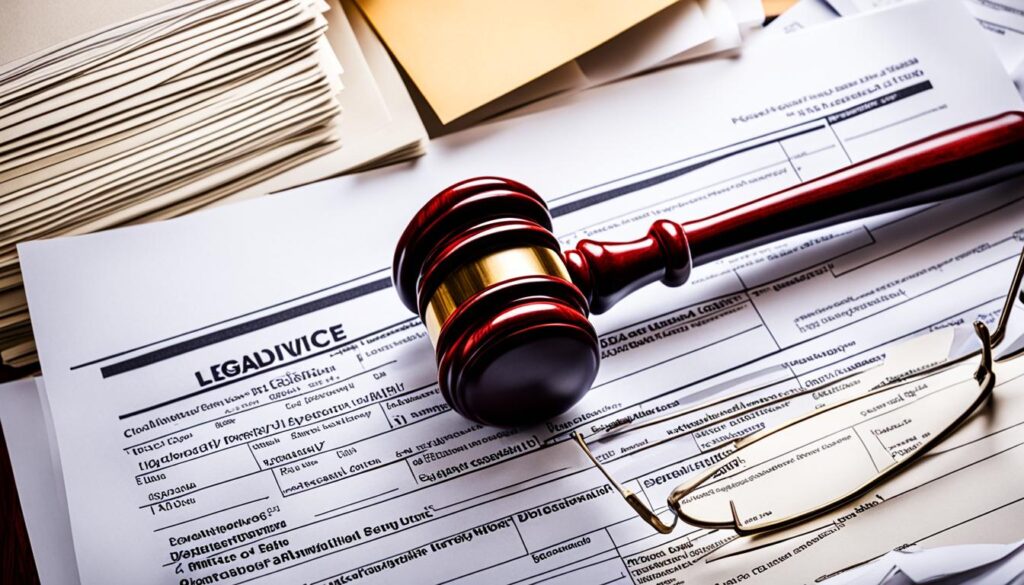
When it comes to the recognition of Dominican divorces by other governments, there is a lack of uniformity. Each jurisdiction has its own laws and regulations governing the recognition of foreign divorces. While some jurisdictions may grant recognition to a Dominican divorce based on the principle of comity, others may require additional criteria to be met.
For example, in the United States, the recognition of a Dominican divorce varies from state to state. Some states may recognize a Dominican divorce as long as it was obtained in compliance with the laws of the Dominican Republic. However, other states may have more stringent requirements, such as requiring both parties to have been personally present during the divorce proceedings in the Dominican Republic.
New York is one state that recognizes bilateral Dominican divorces, but it has specific conditions that must be met for recognition. Both parties must have participated in the divorce proceedings, and one party must have physically appeared before the court in the Dominican Republic. Failure to meet these conditions may result in the non-recognition of the Dominican divorce in New York.
To navigate the complexities of the recognition of Dominican divorces by other governments, it is crucial to consult with a competent attorney who is familiar with the laws and requirements of the desired jurisdiction. An experienced attorney can provide expert guidance and assistance in ensuring that the Dominican divorce is recognized and enforced in the desired jurisdiction.
Examples of Recognition of Dominican Divorces
Below are some examples of how different jurisdictions approach the recognition of Dominican divorces:
| Jurisdiction | Recognition Criteria |
|---|---|
| New York | Both parties participated in the divorce proceedings, and one party physically appeared before the court in the Dominican Republic. |
| California | The divorce was obtained in compliance with the laws of the Dominican Republic. |
| Florida | Both parties were personally present during the divorce proceedings in the Dominican Republic. |
It is important to note that the table above is for illustration purposes only and should not be considered an exhaustive list of recognition criteria for every jurisdiction. The laws regarding the recognition of foreign divorces can vary significantly, and it is essential to consult with a competent attorney for specific guidance based on the desired jurisdiction.
Legal Options and Grounds for Divorce in the Dominican Republic
When it comes to divorce in the Dominican Republic, there are various legal options and grounds available. Whether it’s due to irreconcilable differences, adultery, abuse, abandonment, habitual drunkenness, or drug use, couples have the opportunity to file for divorce based on specific reasons. The court of first instance in the judicial district of either the respondent or plaintiff’s residence has the jurisdiction over divorce proceedings, ensuring a fair and accessible legal process.
To initiate a divorce, one must file a suit, serve summons to the respondent, and present evidence and witnesses to support their case. The process involves thorough examination, ensuring that all parties have the opportunity to present their side and defend their interests. Once the court reaches a judgment, it may also address important matters such as custody arrangements for any children involved in the divorce, aiming to protect their best interests and well-being.
“Divorce for cause in the Dominican Republic allows individuals to seek legal resolution when their marriage becomes untenable due to a variety of reasons. This ensures that those facing challenging circumstances have legal recourse and the ability to move forward towards a brighter future.”
Grounds for Divorce in the Dominican Republic:
- Irreconcilable differences
- Adultery
- Conviction of a spouse on a criminal charge
- Abuse or serious insults
- Voluntary abandonment of the home
- Habitual drunkenness or drug use
By providing these legal options, the Dominican Republic ensures that individuals who find themselves in difficult marital situations have the means to seek resolution and pursue a happier, more fulfilling life.

| Grounds for Divorce | Definition | Evidence Required |
|---|---|---|
| Irreconcilable Differences | When spouses can no longer resolve their conflicts | Statement from both parties |
| Adultery | When one spouse engages in a sexual relationship outside the marriage | Evidence of infidelity |
| Conviction of Spouse on Criminal Charge | When one spouse is convicted of a criminal offense | Official records of conviction |
| Abuse or Serious Insults | When one spouse subjects the other to physical or emotional harm | Evidence of abuse or witnesses |
| Voluntary Abandonment of the Home | When one spouse willingly leaves the marital home without justification | Proof of abandonment |
| Habitual Drunkenness or Drug Use | When one spouse regularly abuses alcohol or drugs, creating an unstable home environment | Evidence of substance abuse |
It is important to consult with a qualified attorney to understand the specific legal requirements and gather the necessary evidence to support your case. With the right guidance, individuals can navigate the divorce process with confidence and seek a fresh start.
Divorce Proceedings for Cause in the Dominican Republic
Divorce proceedings in the Dominican Republic involve several important steps and procedures to ensure a fair resolution. Understanding the process is crucial for a smooth and successful divorce. Here’s what you need to know:
The Suit and Summons
When filing for divorce for cause in the Dominican Republic, the plaintiff begins by filing a suit with the court. This suit outlines the reasons for the divorce and states the desired outcome. After filing the suit, the plaintiff must serve a summons to the respondent, formally notifying them of the divorce proceedings and giving them a chance to respond.
Statements and Observations
During divorce proceedings, both the plaintiff and the respondent have the opportunity to present their statements and observations to the court. The plaintiff will present their reasons for seeking the divorce, submit relevant documents as evidence, and may call witnesses to support their case. The respondent then has the chance to respond, present their own evidence and witnesses, and make their own observations about the divorce.
The divorce proceedings in the Dominican Republic follow a comprehensive process, allowing both parties to present their side and provide evidence. This ensures fairness and gives everyone involved an opportunity to be heard.” – Dominican Divorce Attorney
Court Record and Judgment
Throughout the divorce proceedings, the court clerk records all the statements, objections, evidence, and observations, creating a detailed court record. Once both parties have presented their cases, the court will render a judgment based on the evidence and arguments presented. The judgment will determine the outcome of the divorce, including issues such as the division of assets and child custody arrangements.
Appeals
After the judgment is rendered, either party has the right to appeal the decision within a specific timeframe. An appeal allows the case to be reviewed by a higher court and potentially reconsidered. It is important to note that the grounds for appeal are typically limited to errors in the application of the law or procedures rather than a reassessment of the evidence or arguments already presented.
Overall, divorce proceedings for cause in the Dominican Republic follow a structured process to ensure fairness and protect the rights of both parties involved. It is crucial to follow the proper procedures, have legal representation, and present a strong case to achieve a favorable outcome.
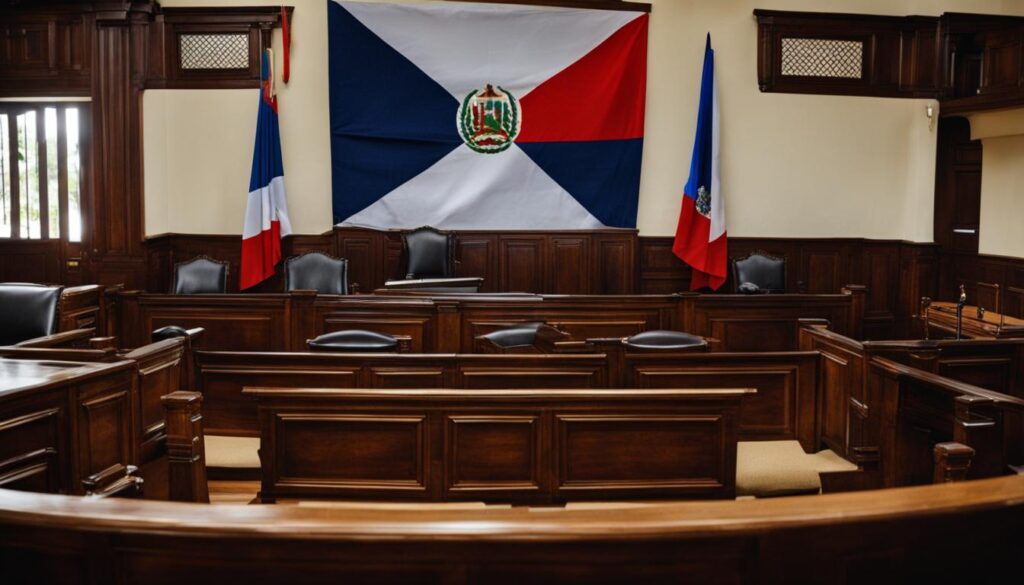
Custody and Support in Dominican Republic Divorce
In a Dominican Republic divorce, the issue of custody of children holds significant importance. When both parties agree on custody arrangements, the court generally respects their agreement. However, in cases where no agreement is reached, the court will determine custody based on the best interests of the children involved.
Typically, children under four years of age remain with their mother, whereas older children may be placed with the spouse granted the divorce or even with another party if it is deemed to be in the children’s best interest.
It is important to note that both parents have an ongoing responsibility to provide support and contribute to the education of their children. The court will consider the financial resources of both parents when determining the amount of support payments required.
Whether custody and support arrangements are determined through mutual agreement or court determination, the primary objective is to prioritize the well-being and best interests of the children involved.
Important points:
- Agreement between parties on custody is generally respected by the court.
- If no agreement is reached, custody is determined based on the best interests of the children.
- Children under four years of age usually remain with their mother, while older children may be placed with the spouse granted the divorce or another party if in their best interest.
- Both parents have a responsibility to support and contribute financially to the education of their children.
Requirements for Dominican Divorce
Obtaining a divorce in the Dominican Republic requires specific documents to ensure a smooth process. These documents must be presented during the divorce proceedings and when transcribing the divorce judgment with the City Clerk.
Required Documents
- Original or certified copy of the marriage certificate
- Birth certificates of children
- Passports or proof of citizenship
- Plane ticket for entry and departure from the Dominican Republic
Preparing and gathering these necessary documents beforehand is crucial to avoid delays and complications during the divorce process.
If you are unsure about any of the required documents or need assistance in obtaining them, it is advisable to consult with a local attorney familiar with Dominican divorce law. They can guide you through the process and ensure that you have all the necessary documentation in order.
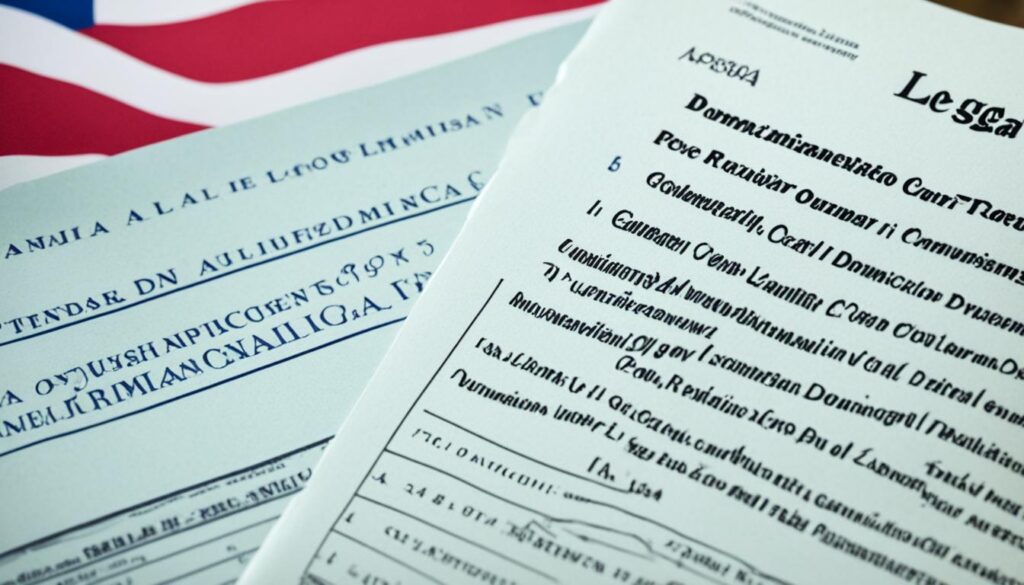
| Required Documents | Description |
|---|---|
| Marriage Certificate | The original or certified copy of the marriage certificate is required to prove the existence of the marriage. |
| Birth Certificates | Birth certificates of any children from the marriage must be provided as proof and to establish custody arrangements. |
| Passports or Proof of Citizenship | Valid passports or other official documents proving citizenship for both parties are necessary for identification and legal purposes. |
| Plane Ticket | A plane ticket for entry and departure from the Dominican Republic is required to show proof of travel plans during the divorce process. |
Historical Context of Dominican Divorce Law
The history of Dominican divorce law provides valuable insight into the current legal framework. In 1971, the Dominican Republic enacted significant changes to its divorce laws, primarily motivated by the decline in Mexico’s popularity as a destination for quick divorces. This reform aimed to attract the migratory divorce trade, making it easier for foreigners to dissolve their marriages in the Dominican Republic.
By liberalizing its divorce laws, the Dominican Republic created a more accessible pathway for individuals seeking divorce. This historical context is crucial for understanding the nuances and implications of divorce law in the country today.
Understanding the historical context of Dominican divorce law is essential when considering divorce proceedings in the country. It allows individuals to navigate the intricacies of the legal system and make informed decisions that align with their needs and circumstances.
Obtaining Legal Assistance for Dominican Divorce
Due to the complexity of Dominican divorce law and the potential legal restrictions in the U.S., it is advisable to consult with a local attorney in the Dominican Republic. A local attorney can provide guidance, advice, and legal representation throughout the divorce process. They can help navigate through the legal requirements, ensure compliance with procedures, and protect the individual’s rights and interests. Hiring a reputable and experienced attorney is essential for a successful divorce in the Dominican Republic.
When seeking legal assistance for a Dominican divorce, consider the following benefits:
- Expertise in Dominican Divorce Law: A local attorney specializing in Dominican divorce law will have in-depth knowledge of the legal system and the specific requirements for obtaining a divorce in the country.
- Proper Documentation: An attorney can assist in gathering and preparing all the necessary documents required for the divorce proceedings, ensuring that nothing is overlooked or improperly submitted.
- Compliance with Procedures: Divorce procedures in the Dominican Republic can be complex and require strict adherence to specific steps. A local attorney will guide you through the process, ensuring you meet all the necessary deadlines and fulfill the required obligations.
- Protection of Rights and Interests: With a legal representative by your side, your rights and interests will be safeguarded throughout the divorce proceedings. An attorney will advocate for your best interests and work to secure a favorable outcome.
- Negotiations and Mediation: In cases where disputes arise during the divorce process, an attorney can assist in negotiations and mediation to reach a fair and amicable resolution.
Choosing the right attorney is crucial for the success of your Dominican divorce. Consider the attorney’s experience, reputation, and track record in handling divorce cases. Take the time to schedule consultations and discuss your specific needs and expectations. Remember, hiring a local attorney will give you access to their expertise in Dominican divorce law and increase your chances of a smooth and successful divorce.
Factors to Consider When Hiring a Local Attorney
| Factors | Description |
|---|---|
| Experience | An attorney with substantial experience in Dominican divorce law will be well-equipped to handle your case efficiently. |
| Reputation | Consider the attorney’s reputation within the legal community and among their previous clients. |
| Track Record | Review the attorney’s track record in handling divorce cases and their success rate in achieving favorable outcomes. |
| Communication Skills | Effective communication is essential when working with an attorney. Ensure that your attorney is responsive and able to explain complex legal matters in a clear and understandable manner. |
| Availability | Consider the attorney’s availability and workload to ensure they can dedicate sufficient time and attention to your case. |
By hiring a reputable local attorney, you can navigate the complexities of Dominican divorce law with confidence and increase your chances of a successful resolution to your divorce proceedings.
Considerations for U.S. Citizens Seeking a Dominican Divorce
U.S. citizens who are considering obtaining a divorce in the Dominican Republic need to be aware of the legal considerations involved. While some U.S. states may recognize Dominican divorces, others may have specific criteria or procedures for recognizing divorces obtained abroad. It is crucial to consult with an attorney in the individual’s state of residence to determine whether the courts will recognize a Dominican divorce as valid.
A state attorney can provide valuable guidance on the specific requirements and implications of obtaining a Dominican divorce. They will help navigate any legal restrictions and ensure that all necessary steps are taken to meet the criteria for recognition by U.S. courts.
Legal considerations for U.S. citizens, Recognition by U.S. courts, Consultation with state attorney
When seeking a Dominican divorce, consulting with a state attorney is the best course of action to protect your legal rights and interests throughout the process. They can provide the necessary expertise to help ensure a smooth and valid divorce.
Conclusion
In summary, Dominican Republic divorce law provides options for couples seeking to end their marriage. Whether through a divorce by mutual consent or a divorce for cause, the process involves filing a suit, presenting evidence and witnesses, and ultimately reaching a judgment. However, it is important to note that the recognition of a Dominican divorce by other governments, such as the United States, depends on the laws of the specific jurisdiction.
If you are considering a Dominican divorce, it is crucial to consult with a local attorney who can guide you through the procedures and inform you of any legal restrictions that may apply. Understanding the requirements and potential implications of a Dominican divorce is essential for a successful outcome. By seeking legal assistance and ensuring compliance with the necessary procedures, you can navigate the process with confidence.
Remember, divorce is a significant life event, and it is important to approach it with careful consideration and expert guidance. By staying informed and obtaining the necessary legal support, you can navigate the complexities of Dominican Republic divorce law and make decisions that are in your best interest.
FAQ
What is the process for obtaining a divorce in the Dominican Republic?
To obtain a divorce in the Dominican Republic, certain steps must be followed, including filing the judgment in the Office of the Civil Registry and receiving a pronouncement. It is advisable to consult with a local attorney for guidance and legal representation.
What types of divorces are available in the Dominican Republic?
In the Dominican Republic, there are two types of divorces available: divorce by mutual consent and divorce for cause. Divorce by mutual consent does not require proving a specific cause and doesn’t require residency. Divorce for cause is based on specific grounds, such as adultery or incompatibility of character, and requires the personal appearance of the plaintiff or their legal representative.
What documents are required to obtain a Dominican divorce decree?
To obtain a Dominican divorce decree, certain documents must be presented, such as the original or certified copy of the marriage certificate, a special power of attorney executed by the non-appearing spouse, and proof of identity. It is important to gather and prepare all the necessary documentation.
Will a Dominican divorce be recognized in other countries, including the United States?
Recognition of a Dominican divorce by other governments, including the United States, will depend on the laws of that jurisdiction. While some states may recognize Dominican divorces, others may have specific requirements or criteria for recognition. It is important to consult with an attorney in the individual’s state of residence for guidance.
What grounds can a divorce for cause be filed on in the Dominican Republic?
Divorces for cause in the Dominican Republic can be filed based on various grounds, including mutual consent, irreconcilable differences, adultery, conviction of a spouse on a criminal charge, abuse or serious insults, voluntary abandonment of the home, and habitual drunkenness or drug use.
How do divorce proceedings for cause in the Dominican Republic work?
Divorce proceedings for cause involve filing a suit, serving a summons to the respondent, presenting evidence and witnesses, and reaching a judgment. The judgment can be appealed within a specific timeframe. It is important to follow the proper procedures and have legal representation during divorce proceedings.
How is custody of children determined in Dominican Republic divorces?
Custody of children in Dominican Republic divorces is determined based on the best interest of the children. If the parties have an agreement, the court generally honors it. However, if there is no agreement, the court will make a decision considering the children’s best interest and their age.
What are the requirements for obtaining a Dominican divorce?
Requirements for obtaining a Dominican divorce include presenting certain documents, such as the marriage certificate, birth certificates of children, passports or proof of citizenship, and a plane ticket for entry and departure from the Dominican Republic. It is important to ensure all required documents are prepared.
What is the historical context of Dominican divorce law?
The Dominican Republic’s divorce law underwent liberalization in 1971 to attract the migratory divorce trade. This change in the law allowed foreigners to obtain divorces in the Dominican Republic more easily. Understanding the historical context of Dominican divorce law is important to grasp its current implications.
Is it necessary to hire a local attorney for a Dominican divorce?
Due to the complexity of Dominican divorce law and the potential legal restrictions in the U.S., it is advisable to consult with a local attorney in the Dominican Republic. A local attorney can provide guidance, advice, and legal representation throughout the divorce process, ensuring compliance with procedures and protecting the individual’s rights and interests.
What considerations should U.S. citizens keep in mind when seeking a Dominican divorce?
U.S. citizens seeking a Dominican divorce should consider potential legal restrictions and the recognition of a Dominican divorce by U.S. courts. It is important to consult with an attorney in the individual’s state of residence to determine whether the courts will recognize a Dominican divorce as valid and to understand the specific requirements and implications.
Can divorces obtained in the Dominican Republic be recognized in other countries?
Recognition of divorces obtained in the Dominican Republic by other countries, including the United States, will depend on the laws of the specific jurisdiction. While some states may grant recognition, others may not. It is important to consult with legal professionals to understand the recognition process and requirements.

